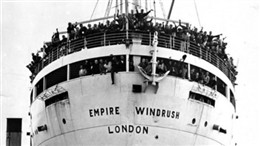The Pressures on the NHS

HMT Empire Windrush
Challenges facing the system
By Dan Thomas
Following the enactment of the National Health Service, millions of people had access to healthcare that they lacked before 1948. This led to massive increases in demand for every sort of medical service. The Aberdeen Press and Journal reported that "more than a million people applied for free dental treatment" within the first two months of the NHS. In Gloucester, council opticians reported at the beginning of the 1949 that they were receiving 300 applications for glasses every day, around 27,000 in total since July of 1948. Shortages of qualified pharmacists were reported by the Lincolnshire Echo in 1949, evidence of the pressures and increased demand on the system even more than a year after its creation. Hospitals all over reported nursing and bed shortages, as well as long waiting lists. In Colchester in March of 1949, 2,163 people waited for hospital beds, many of which remained empty due to nursing and staff shortages. At the same time, doctors, dentists, ambulance staff, and other medical workers struggled with the increased workload.
The issue was not with infrastructure, but with the labor pool. Within Britain, there simply were not enough medical professionals and no way to hire and train them quickly. The solution to this came with the British Nationality Act of 1948, which granted subjects of the British Empire and its colonies citizenship and the opportunity to settle in Britain. The first group of immigrants came on the HMT Empire Windrush, bearing hundreds of men and women from the Caribbean looking to make new lives for themselves. Thousands of immigrants from all over the world came to Britain from 1948 to 1962, when the first limitations on immigration were instated. These people became known as the "Windrush Generation."
"The Doctors are being called upon to treat the most minor ailments, which formerly would have passed almost un-noticed, because it is so easy to ask for a prescription and get a bottle of 'physic' from a chemist." - West Sussex Gazette, 18 November 1948
"Mr. Aneurin Bevan, Minister of Health, appealed yesterday to people to use their doctors wisely, and only when they really need them." - Western Morning News, 30 September 1948
"In the first four months of the scheme the ambulances responded to 5,278 calls, carried 6,654 persons, and covered 95,432 miles. In contrast, before July 5 the monthly average was 550 persons carried and 1,663 miles covered." - Gloucester Citizen, 12 January 1949